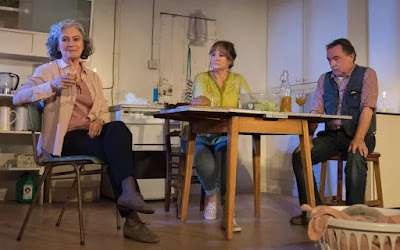Theater: The Children is a smart, well crafted apocalyptic human drama
The Children
Written by Lucy Kirkwood
Directed by James Macdonald
Starring Francesca Annis, Deborah Findlay, Ron Cook
Manhattan Theater Club Samuel J. Friedman Theater
December 24, 2017
Apocalyptic literature falls into several categories. Most
dramatic are those that portray exaggerated, hyper-violent or hyper-chaotic human responses as in Lord of the
Flies. Such efforts include the recent plays Mercury
Fur and A Clockwork Orange. Others show normal, often overwhelmed people placed in
a violent or intolerable landscape: the recent play Arlington, Cormac McCarthy's novel The
Road, the moving 1983 film Testament, and Orwell's 1984 are examples. The Children, a new play by British author Lucy Kirkwood, is an example of a third genre, apocalypse hinted at darkly but not directly shown, relying on the viewer's imagination. Other recent examples of this genre include Caryl Churchill’s Escaped Alone--three ladies hinting at
awful things in a backyard garden party, or Wallace Shawn’s Evening at the Talk House, where awful
things are revealed at a Manhattan cocktail party. All of these are
hyper-realistic by demonstrating that, however calamitous the apocalypse, people
are people, and continue their romances, intrigues, gossip, and somehow fit the
new landscape into their ongoing lives.
The Children was
for me the best of these. Playwright Kirkwood creates a teasing, suspenseful
drama, in which apocalypse—here a Fukuoka-like nuclear reactor explosion that
contaminates a large area of Britain—is hinted at but not fully described and
explicated until near the end of the play. In fact, much of the play proceeds
as a domestic drama around three 60’ish nuclear physicists. Robin and Hazel,
who still live near the reactor site, are visited by Rose, who worked with them
at the reactor years ago, but since moved away. She enters with a nosebleed, seemingly
innocuous but actually fraught with significance given subsequent events in the
play. Her bloodstained shirt remains a constant metaphor of mortality
throughout the play. An old (and smoldering) love triangle is revealed
gradually, and the playwright feints by making us think that will be the
(unsatisfying) focus. But throughout, other more ominous events occur, usually
without much fuss. The electricity in the shabby kitchen (where the entire drama
plays out) is unreliable, as is waste disposal. People have illness and hair
loss. These omens are superimposed on a childlike reunion-like atmosphere of
the three old friends (and lovers), one sense of the “children” referred to in
the title. Another is the limited emotional development of one of Hazel and Robin’s
kids, a 38 year old who seemingly cannot make any routine decisions without
calling her mum. This provides the playwright with some chances to take shots
at millennial parenting and child development, and establish a subtheme on the
degree to which we are responsible for our children. This standing alone would
be an extraneous and unsatisfying sideroad, until Kirkwood finally, near the
end of the 100-minute single-act play, plays her final card. Why has Rose (an
outstanding Francesca Annis, below left) suddenly appeared after all these years—romance?
Curiosity about the disaster site? It turns out that she wants to recruit Robin
and Hazel to join a group of older physicists to work on the still-hot site to
clean it up, thus sparing younger people the physical risks of radiation. These
risks are displayed as quite real, marked by the aforementioned nosebleed, and some
chilling use of clicking Geiger counters during the play. However, Hazel is
unwilling to cooperate—she is somewhat obsessively devoted to extending her
life using yoga, veganism, sunscreen while indoors, etc. This plot device,
admittedly a bit contrived, allows Kirkwood to explore some meaty issues, e.g.
a generation’s responsibility to later generations, the value of young lives
vs. older ones, and the value of sick lives vs. those of the well. Her
portrayal of these three 60-somethings as still vibrant, engaged, and, yes, a
bit childish (e.g. jealousy, poop jokes) gives another meaning to the title and
refuses to let us fall into stereotypes of older people. A fun sequence in
which they bring back their past by line-dancing to James Brown is a nice
example of this, albeit a little too prolonged.
What I liked best about The
Children was its very British understatement. I left more disturbed about
this environmental and human tragedy than if it had been displayed more
explicitly. And, the insistence of these three characters in going about their
trivial, flawed lives at all costs seemed very human. Ironically, the arrival
of a character whose noble intent of serving (and saving) a younger generation
from an older generation’s mistakes causes the psychological disruption that
implodes the very-human denial and routine that govern Robin and Hazel’s lives.
Why haven’t they moved away from the
disaster site? Familiarity is yet another human characteristic. Both the writing and the excellent direction
of James Macdonald keep this complex goulash of themes together, and the steady
dribbling of horrible little hints into the domestic drama keep it tense. All
in all, this is a well written, masterful drama that showcased a resourceful
playwright, a shrewd director, and three outstanding actors.

Comments
Post a Comment